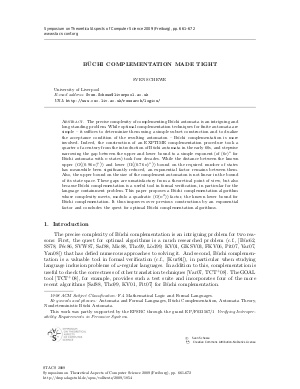Büchi Complementation Made Tight
Author Sven Schewe
-
Part of:
Volume:
26th International Symposium on Theoretical Aspects of Computer Science (STACS 2009)
Part of: Series: Leibniz International Proceedings in Informatics (LIPIcs)
Part of: Conference: Symposium on Theoretical Aspects of Computer Science (STACS) - License:
 Creative Commons Attribution-NoDerivs 3.0 Unported license
Creative Commons Attribution-NoDerivs 3.0 Unported license
- Publication Date: 2009-02-19
File

PDF
LIPIcs.STACS.2009.1854.pdf
- Filesize: 189 kB
- 12 pages
Document Identifiers
Subject Classification
Keywords
- Automata and formal languages
- Buchi complementation
- Automata theory
- Nondeterministic Buchi automata
Metrics
- Access Statistics
-
Total Accesses (updated on a weekly basis)
0PDF Downloads0Metadata Views
Abstract
The precise complexity of complementing B\"uchi\ automata is an intriguing and long standing problem. While optimal complementation techniques for finite automata are simple -- it suffices to determinize them using a simple subset construction and to dualize the acceptance condition of the resulting automaton -- B\"uchi\ complementation is more involved. Indeed, the construction of an EXPTIME complementation procedure took a quarter of a century from the introduction of B\"uchi\ automata in the early $60$s, and stepwise narrowing the gap between the upper and lower bound to a simple exponent (of $(6e)^n$ for B\"uchi\ automata with $n$ states) took four decades. While the distance between the known upper ($O\big((0.96\,n)^n\big)$) and lower ($\Omega\big((0.76\,n)^n\big)$) bound on the required number of states has meanwhile been significantly reduced, an exponential factor remains between them. Also, the upper bound on the size of the complement automaton is not linear in the bound of its state space. These gaps are unsatisfactory from a theoretical point of view, but also because B\"uchi\ complementation is a useful tool in formal verification, in particular for the language containment problem. This paper proposes a B\"uchi\ complementation algorithm whose complexity meets, modulo a quadratic ($O(n^2)$) factor, the known lower bound for B\"uchi\ complementation. It thus improves over previous constructions by an exponential factor and concludes the quest for optimal B\"uchi\ complementation algorithms.
Cite As Get BibTex
Sven Schewe. Büchi Complementation Made Tight. In 26th International Symposium on Theoretical Aspects of Computer Science. Leibniz International Proceedings in Informatics (LIPIcs), Volume 3, pp. 661-672, Schloss Dagstuhl – Leibniz-Zentrum für Informatik (2009)
https://doi.org/10.4230/LIPIcs.STACS.2009.1854
BibTex
@InProceedings{schewe:LIPIcs.STACS.2009.1854,
author = {Schewe, Sven},
title = {{B\"{u}chi Complementation Made Tight}},
booktitle = {26th International Symposium on Theoretical Aspects of Computer Science},
pages = {661--672},
series = {Leibniz International Proceedings in Informatics (LIPIcs)},
ISBN = {978-3-939897-09-5},
ISSN = {1868-8969},
year = {2009},
volume = {3},
editor = {Albers, Susanne and Marion, Jean-Yves},
publisher = {Schloss Dagstuhl -- Leibniz-Zentrum f{\"u}r Informatik},
address = {Dagstuhl, Germany},
URL = {https://drops.dagstuhl.de/entities/document/10.4230/LIPIcs.STACS.2009.1854},
URN = {urn:nbn:de:0030-drops-18543},
doi = {10.4230/LIPIcs.STACS.2009.1854},
annote = {Keywords: Automata and formal languages, Buchi complementation, Automata theory, Nondeterministic Buchi automata}
}
